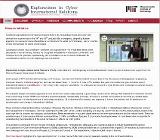| dc.description.abstract | Exploration in Cyber International Relations (ECIR), is the label of a multidisciplinary and multidimensional research project initiated under a grant from the Minerva Program, Department of Defense.
A joint project of MIT and Harvard University, ECIR included, but was not limited to Political Science, Economics, Business and Management, Engineering, Computer Science, Artificial Intelligence, and Law and Government. In response to new 21st c. realities, the goal is to construct a cyber-inclusive view of international relations (CyberIRworld) – with theory, data, analyses, simulations – to anticipate and respond to cyber threats and challenges to national security and international stability.
The research design is modular (organized in core themes and cross cutting issues), supported by a multi-method strategy that enables the "individual" connect to an overarching "whole." ECIR is anchored in empirical analysis, buttressed by modeling, simulations, and the construction of new tools as needed. Basic assumptions are: (1) interdependence of technology and policy, (2) conjunction of uncertainty and regularity in human interactions, and (3) persistence of transformation and change in international relations.
There is limited understanding of how cyberspace influences international relations and how power and politics in international relations influence the conduct and management of cyberspace. Dominant assumptions of the 20th century politics and policy are severely undermined by the 21st century deeply rooted in the cyber age with its dynamic and changing configurations. There are excellent maps and visual materials for international relations and its various facets. There are excellent maps of cyber access, different representations of traffic, and different features of cyberspace. Missing, however, is a combined view so essential for understanding the implications of the cyber domain and if effects on world politics.
This problem is addressed through the use of multiple perspectives, methodologies, databases, and diverse analytical as initially manifested throughout our Explorations in Cyber International Relations (ECIR). More recently, ECIR continued initially as an extension of the original ECIR research, but soon took on new challenges with new directions of inquiry. ECIR continued focuses on four distinctive but interconnected research themes. | en_US |
